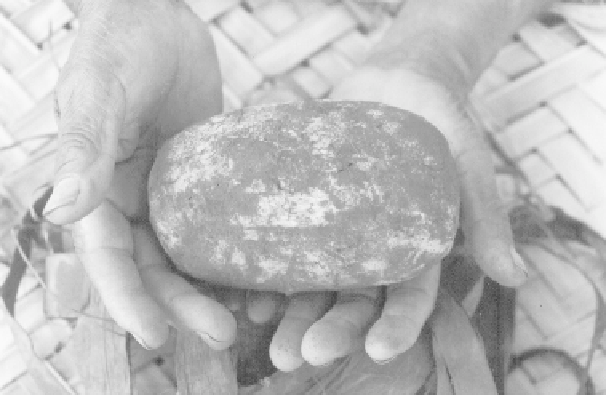Geography Reference
In-Depth Information
Furthermore, the transformation of the value of commodities (such as arrows) into
monetary form does not necessarily transform a reciprocal system of exchange into
one geared exclusively toward the accumulation of material wealth. No doubt money
as an abstraction is, as Trompf has shown for Papua New Guinea, “capable of being
divinized and mythologized, on the one hand, and held up as the supreme symbol
of secularity and this-worldly success, on the other” (1994:410). In the Xingu Park,
however, it similiary happens that “in the heat of the newer business transactions
of a supra-local and largely urban kind, money becomes quickly detached into a
mundane or profane sphere of its own” (1994:410). Exchanges of industrial goods in
the Xingu Park have increasingly been monetarized, while ceremonial gift exchanges
among different peoples are less likely to entail presentations of money.
Figure 1.9. A bar of urucu (Bixa orellana), the red ochre body and hair dye used throughout
central Brazil and the Amazon. Like caxiri, urucu is a gift that triggers the circulation of wealth.
It is thus fundamental to distinguish between reciprocity and the circulation of
money in capitalist societies. As anthropologist T. Crump (1992:96) sees it:
Reciprocity is the principle upon which the circulation of money is based.
Its general meaning is that for every benefit conferred by one person upon
another, something must eventually be given in return. In the context of money,
either the original or the return benefit must take the form of a payment....
This may add up to no more than an established pattern of gift-giving, for as
Mauss (1968:194) demonstrated in his classic study, the acceptance - in any
traditional society - of any gift, automatically implies the acceptance of any
number of well recognized social obligations which go with it.

